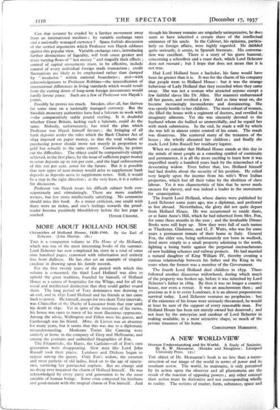A CHAMPION OF INTERNATIONALISM
Monetary Nationalism and International Stability. By F. A. von Hayek. (Longmans. 5s.)
AN optimistic eye, roving over the world's affairs, may here and there note signs that the flood tide of economic nationalism is on the ebb. In Canada High Protectionism, fighting as such, gets soundly beaten in a key by-election ; Italy and Jugoslavia conclude a trade agreement ; Australian High Commissioners, enquiring into the plight of the Northern Territories, actually suggest complete Free Trade as a remedy. The shape of the Anglo-American trade pact begins to be perceptible, like a vast continental shelf, beneath the waters. France offers Germany a deal in colonial raw materials. It does seem just possible, with all these olive branches, that Ararat is under our keel. In the realm of theory, however, the main still comes flooding in, by no means silently ; Mr. Keynes, in the role of Neptune, directing the attack. One hails with relief this stout rejoinder from the camp of those who have steadfastly refused to set the seal of intellectual approval on a lamentable fait accompli.
Deliberately, though with regret, Professor von Hayek restricts himself to the field of monetary theory. Briefly, his thesis is that our gold standard has proved defective not because it is international but because it is nowhere near international enough. A truly homogeneous and universal international currency may bear the name of " pounds " in one country and " dollars " in another, and economic realities be no more affected than is the textile trade by the measurement of its material in yards here and metres there. But we have never had such a currency. We have had not a gold standard but a gold nucleus standard ; and around their respective nuclei the nations have, through the medium of their (accidentally) national banking systems, built up national currency and credit structures of widely different ranges of liquidity. International transactions and their consequences have thus fallen into a different category, and under different rules, from those carried on between mere geographical regions. In particular, by initially focussing the whole effect of all net outflows of income on the central banks (which with their gold reserves act both as the repositories of the only completely liquid money and as regulators of credit), it distorts the incidence of those out- flows. It causes them to affect most severely not those from whom demand has been diverted but those who make most use of credit, which is an entirely different thing. Hence the dislocating effect of gold outflows, and hence the popular outcry against the tyranny of the gold standard. Can that tyranny be evaded by a further movement away from an international medium ; by variable exchange rates and a nationally managed currency ? Space forbids discussion of the serried arguments which Professor von Hayek adduces against this popular view. Variable exchange rates, introducing further distinctions of liquidity, will both cause greater and more varying flows of " hot money " and magnify their effects ; control of capital movements must, to be effective, include control of every individual foreign trade transaction ; credit fluctuations are likely to be emphasised rather than damped by " insulation " within national boundaries ; and—with acknowledgments to Professor Robbins—the intensification of international differences in living standards which would result from the cutting down of long-term foreign investments would hardly favour peace. Such are a few of Professor von Hayek's
roints.
Possibly he proves too much. Sweden, after all, has thriven for some time on a nationally managed currency. But the Swedish monetary authorities have had a fulcrum to work with —the comparatively stable pound sterling. It is doubtful whether Great Britain, lacking such a fulcrum, could do the same. Nobody, unfortunately, has tried the plan which Professor von Hayek himself favours ; the bringing of all bank deposits under the rules which the Bank Charter Act of 1844 imposed on paper money, so that the total volume of purchasing power should move not merely in proportion to gold but actually to the same extent. Cautiously, he points out the difficulties. The object could be comparatively simply achieved, in the first place, by the issue of sufficient paper money to cover deposits up to too per cent., and the legal enforcement of this zoo per cent. cover for the future. But it is possible that new types of near-money would arise to supplement bank deposits as deposits arose to supplement notes. Still, it would be a step in the right direction ; at the very least, it is a subject for discussion.
Professor von Hayek treats his difficult subject both con- scientiously and stimulatingly. There are more readable writers, but few more intellectually satisfying. No economist should miss this book. As a minor criticism, one could wish there were an index, and one's feelings towards the proof- reader become positively bloodthirsty before the last page is















































 Previous page
Previous page